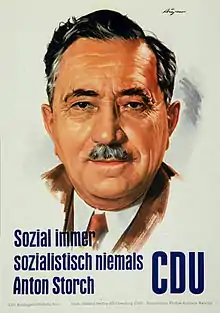Anton Storch | |
|---|---|
 | |
| Federal Minister for Labour | |
| In office 20 September 1949 – 29 October 1957 | |
| Chancellor | Konrad Adenauer |
| Preceded by | Office established |
| Succeeded by | Theodor Blank |
| Member of the Bundestag | |
| In office 7 September 1949 – 19 October 1965 | |
| Personal details | |
| Born | (1892-04-01)1 April 1892 Fulda, German Empire |
| Died | 26 November 1975(1975-11-26) (aged 83) Fulda, West Germany |
| Nationality | German |
| Political party |
|
Anton Storch (1 April 1892 – 26 November 1975) was a German trade unionist, politician, a member of the Christian Democratic Union (CDU) and the minister of labor from 1949 to 1957.[1]
Early life
Storch was born in Fulda, Hesse, in 1892.[2] He was trained as a carpenter and served in World War I.[2]
Career
Storch was the functionary of Woodworker's Christian Trade Union from 1920 to 1933, trade union chairman of Hanover region from 1931 to 1933 and insurance agent until 1939.[2] From 1939 to 1945 he served as a member of air raid police.[2] He contributed to the reestablishment of the trade unions in Hanover (British Zone) in 1945 and 1946.[2] From 1946 to 1948, he served as the chief of department for social policy of British Zone trade unions.[3] He became a member of Bizonal Economic Council in 1947 and was named its director of labor in 1948.[2] He was the director of the workers' union (Verwaltung für Arbeit (VfA)) until 1949.[4]
He was a member of the Christian Democratic Union (CDU)[5] and one of the CDU representatives in the Bundestag.[2] He became a member of the Bundestag in 1949 and served there until 1965.[6] In the party he served at the social affairs committee.[7] Then he was appointed minister of labor and social affairs to the cabinet led by Prime Minister Konrad Adenauer on 20 September 1949.[4] He was in office until 29 October 1957[8] when Theodor Blank replaced him in the post.
Views
Storch was an advocate of "far-reaching social welfare programme"[7] and of Catholic political economy.[9] He argued that the reason for two world wars was the "exaggerated liberal-capitalistic economic order of the last one hundred years."[6]
References
- ↑ Günter Buchstab; Brigitte Kaff; Hans-Otto Kleinmann. "Christliche Demokraten gegen Hitler" (PDF). GBV (in German).
- 1 2 3 4 5 6 7 "Storch, Anton (CDU)". Elections and Political Parties in Germany, 1945–1952. Salisbury, NC: Documentary Publications. 1952. p. 28.
- ↑ Barbara Marshall (1986). "The Democratization of Local Politics in the British Zone of Germany: Hanover 1945-47". Journal of Contemporary History. 21 (3): 428–430. doi:10.1177/002200948602100304. S2CID 154840068.
- 1 2 James M. Diehl (2000). Thanks of the Fatherland: German Veterans After the Second World War. Chapel Hill, NC: University of North Carolina Press. p. 72. ISBN 978-0-8078-6103-5.
- ↑ "Adenauer aims to slow down". The Spokesman-Review. 8 September 1953. Retrieved 7 July 2013.
- 1 2 Maria Mitchell (June 1995). "CDU Politicians and National Socialism, 1945-1949". The Journal of Modern History. 67 (2): 289. doi:10.1086/245092. S2CID 154133689.
- 1 2 Hans-Peter Schwarz (1995). Konrad Adenauer: A German Politician and Statesman in a Period of War, Revolution, and Reconstruction. Vol. 2. Providence, RI: Berghahn Books. ISBN 1-57181-870-7.
- ↑ Die NATO-Option. Munich: R. Oldenbourg Verlag. 1993. p. 1216. ISBN 978-3-486-51691-3.
- ↑ James Chappel (November 2015). "Catholicism and the Economy of Miracles in West Germany, 1920-1960". New German Critique. 42 (3): 35. doi:10.1215/0094033x-3136985.
External links
- Newspaper clippings about Anton Storch in the 20th Century Press Archives of the ZBW
 Media related to Anton Storch at Wikimedia Commons
Media related to Anton Storch at Wikimedia Commons
Anton Storch navigational boxes | |||||||||||||||||||||||||||||||||||||||||||||||||||||||||||||||||||||||||||||||||||||||||||||||||||||||||||||||||||||||||||||||||||||||||||||||||||||||||||||||||||||||||||||||||||||||||||||||||||||||||||||||||||||
|---|---|---|---|---|---|---|---|---|---|---|---|---|---|---|---|---|---|---|---|---|---|---|---|---|---|---|---|---|---|---|---|---|---|---|---|---|---|---|---|---|---|---|---|---|---|---|---|---|---|---|---|---|---|---|---|---|---|---|---|---|---|---|---|---|---|---|---|---|---|---|---|---|---|---|---|---|---|---|---|---|---|---|---|---|---|---|---|---|---|---|---|---|---|---|---|---|---|---|---|---|---|---|---|---|---|---|---|---|---|---|---|---|---|---|---|---|---|---|---|---|---|---|---|---|---|---|---|---|---|---|---|---|---|---|---|---|---|---|---|---|---|---|---|---|---|---|---|---|---|---|---|---|---|---|---|---|---|---|---|---|---|---|---|---|---|---|---|---|---|---|---|---|---|---|---|---|---|---|---|---|---|---|---|---|---|---|---|---|---|---|---|---|---|---|---|---|---|---|---|---|---|---|---|---|---|---|---|---|---|---|---|---|---|
| |||||||||||||||||||||||||||||||||||||||||||||||||||||||||||||||||||||||||||||||||||||||||||||||||||||||||||||||||||||||||||||||||||||||||||||||||||||||||||||||||||||||||||||||||||||||||||||||||||||||||||||||||||||
Authority control databases | |
|---|---|
| International | |
| National | |
| People | |